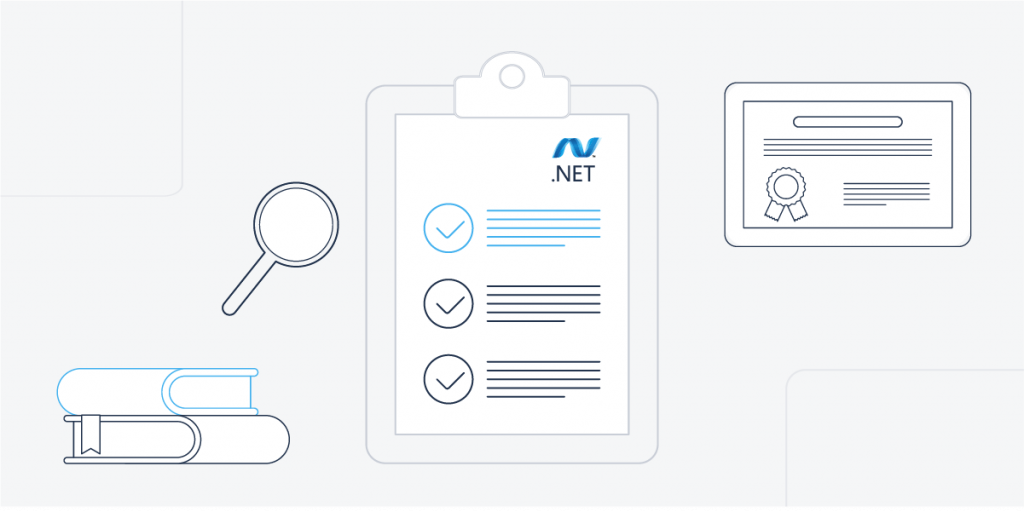Introduction
The .NET platform and technologies encompass a wide variety of tools that are directly related to each other. Such tools allow the developer to work using the C# programming language. The .NET platform is developed by Microsoft, and it is constantly evolving, opening up new opportunities for developers. Good .NET developers are in high demand in the field of information technology, so it may be very challenging to hire .NET developers who are truly competent.
.NET Overview
.NET is one of the most popular development platforms on the market today, having been created by Microsoft in the 1990s. It has many features and tools that help companies build robust desktop, mobile, web, cross-platform, and other types of applications using multiple programming languages.
While there are many software engineers who specialise in .NET, it can be a daunting task to hire .NET developers for many companies. In this article, we’ve put together important tips to successfully hire .NET developers for your project.
To gain a better understanding of the matter, you need to learn some of its basics.
The .NET environment consists of three main components:
- The .NET Core allows applications to run on any operating system, be it Linux, Windows, or macOS.
- The .NET Framework allows you to create and run applications on Windows. The .NET platform includes the Common Language Runtime (CLR), which controls how applications run, and a class library, which is a set of APIs.
- Xamarin is used to create and run applications on various mobile platforms (Android, iOS).
What’s more, .NET developers can enjoy the .NET Standard, which is the common API used in all of the above.
The .NET environment is the choice of many companies because it makes the development process efficient and productive, helping developers build consistent and scalable applications.
What .NET Developers Do
A .NET developer is a programmer capable of creating all types of applications: websites, computer games, mobile software, etc. A .NET programmer mostly uses the Microsoft .NET Framework and many of its tools. As was mentioned above, this platform is based on the C# language.
Many companies are trying to hire .NET developers. They are a valuable resource in any company, because a .NET developer is able to develop a sequence of commands that communicates with applications, databases, and networks.
What Are .NET Developer Skills?
The requirements put forward to such specialists largely depend on the direction of the development project. However, there is a number of general rules to follow if you want to hire .NET developers:
- Perfect knowledge of the C# programming language, as it is the main language used in the .NET framework;
- Understanding of basic structures, system calculus, and basic algorithms. In other words, the developer must have basic programming skills;
- Knowledge of object-oriented programming;
- Knowledge of databases;
- Ability to read and understand someone else’s code;
- Basic Transact-SQL skills;
- Good level of English. If you need to hire .NET developers, you should be aware they must be able to read technical documentation in English. Proficiency in advanced English is an important advantage for a .NET specialist.
What makes the work of .NET developers special is that they are engaged in non-standard projects on a daily basis. If you are aware of this feature and understand what tasks these specialists face, it will be easier for you to attract their attention. Here is a list of some unique tasks for .NET developers:
- Writing scalable and reusable code. Since .NET supports multiple programming languages, developers write code that can be used in different applications.
- Knowledge of the latest version of Visual Studio. Top .NET professionals are proficient in Visual Studio, as Windows websites and applications are mostly developed using this product line.
- Support and optimisation of applications. Despite the fact that some experts believe that applications based on .NET don’t need front-end optimisation and that user data should not be stored on .NET platforms, developers are still involved in application optimisation and database management.
How to Hire a .NET Developer

Create a Job Post
The process of solving the task to hire .NET developers begins with the definition of requirements and the formation of the job offer itself. It is important to create a detailed proposal with clear requirements, responsibilities, and a brief description of the corporate culture and workflow. In addition, in order to draw in the best software developers, the job posting must be attractive and resemble advertising.
The next important step to hire .NET developers is to post your job offer on popular .NET developer platforms. To find talented and qualified individuals, choose trusted websites such as Indeed.com, Crunchbase.com, Glassdoor.com, social networking sites such as LinkedIn Jobs, or developer communities such as GitHub, StackOverflow, Reddit, and more.
Where can I find .NET developers?
In the field of technical recruitment, understanding which online resources are best for finding a specialist of interest is extremely important. Developers eager to learn and share knowledge about .NET projects can be found on specialised forums. It’s also a great idea to check out the .NET community on Stack Overflow and search through the users involved with over 250,000 questions about .NET.
But you should use these resources carefully: don’t forget that job search is far from the only reason developers visit professional spaces.
.NET is a complex technology, so take the opportunity to learn more about it by asking questions from the most active members of the communities. In addition to becoming more technically savvy, you’ll show developers that you’re interested in something other than closing a job.
Outsource .NET Development
A lot of companies consider outsourcing developers to be much simpler and cheaper than hiring them in-house.
Recently, we’ve released the article “In-house Software Development vs Outsourcing: Which Method is a Good Fit For You?”. There we compared the pros and cons of outsourcing and hiring in-house development teams.
Let’s look at the main pros of outsourced developers.
Reduced costs. There is no need for additional costs, such as arranging a workspace, sick days, vacations, and other full-time benefits and overheads.
Less effort. The only thing you have to do is to find a company that offers outsourced developers. Specialists from such companies can choose the exact developers you need for the project depending on your requirements.
Not bound by the local talent pool. A great advantage of outsourcing developers is that you aren’t bound by the local talent pool, which may have a lack of certain specialists. One more pro of it is that there are countries with rates that are lower than the native ones, so it’s simply cheaper.
Flexible work progress. There is no need to train your employees or scour the talent market by yourself. Also, if a certain specialist isn’t a good fit for a project, it’s easier to replace them. One more positive thing is that by the end of the project, you don’t have to keep the person you had hired for some one-off task until their contract runs out.
Different payment options. There are three types of payment outsourced specialists offer: fixed price, time & material, and outstaff. A fixed price approach involves paying an unchanging sum of money for the whole project, usually upfront. The time & material approach means that all the resources spent on the project are calculated in the process of development, and the client pays the accumulated sum when the end product is complete. With outstaffing, the company sells you a certain specialist as a staff unit.
Get more information about different payment options in this article.
But where do you find outsourced developers? There are numerous specialised platforms that gather information about outsourcing companies and specialists. For example, Toptal, Upwork, and Glassdoor could help you search for freelance specialists, while Clutch, Goodfirms, and The Manifest would be helpful in searching for outsourced development companies.
How To Confirm .NET Developers’ Skills
Once you have attracted several candidates with an interesting job offer, the interview phase begins. In order to hire a .NET developer with the full set of required technical skills, it is necessary to prepare a number of different stages of the interview.
The first stage of the interview usually starts with a phone call. Recruiters should test the applicant’s communication skills, clarify some resume points, and ask about the candidate’s job and salary expectations. In addition, a convenient thing to do is to offer preliminary online testing to the applicants. This will check the basic skills of the developer and help to get rid of completely unsuitable candidates. However, this is still not enough to understand whether you can hire the .NET developer you are interviewing.
Technical Interview
This interview should be conducted not only by a recruiter, but also by a developer or a technical specialist from your company. Many companies use project-specific coding tests to ensure that the candidate has a thorough knowledge of the .NET technologies required for their business. In addition to tests, this stage may include a number of technical and non-technical issues for the applicant to solve. It is important to clarify the experience of candidates, the scope of their previous projects, the programming languages they used, the business area they worked in, etc.
Top Questions For The Interview

- What is encapsulation?
Encapsulation is one of the four main features of OOP, which refers to the inclusion of the methods and data necessary for a programming object to function into said object. When answering questions like this in a .NET interview, candidates should mention that encapsulation helps protect data from unwanted access by binding code and data to an object that is a basic, singular autonomous unit of the system.
Another way to understand encapsulation is to think of it as “hiding” the state of an object as private or protected. Under this principle of concealing information, the inner workings of the object are separated from the rest of the application. This is useful because it reduces the chance that other objects can affect the state or behaviour of the object in question.
- Explain the concept of inheritance and how it works in .NET
In general OOP terms, inheritance means that a class can be based on another class, with the child class taking on the attributes of the parent class. For example, programmers can create a class called Device and then child classes called Smartphone, Laptop, and Tablet, all of which will inherit Device attributes.
To demonstrate their understanding of the interview question, candidates can explain how .NET only supports a single inheritance, which means that a class can only inherit from one other class. Their answer might also touch on the transitive nature of inheritance – for example, the iPhone class inherits from Smartphone, which inherits from Device.
- What is the difference between an abstract class and an interface?
An abstract class is always used as the base class. It provides some abstract/virtual members that the inheriting entities should implement, as well as a partial implementation of the functionality. Candidates might mention that this class can also declare fields. Developers cannot create an object from this class.
On the other hand, an interface can only declare properties, methods, and events (no access modifiers). The developer must implement all declared members. In short, an interface denotes a contract/behaviour that implementing classes must have.
- What is a delegate in .NET?
A delegate is an object type that encapsulates a reference to a method. Delegate objects can be transferred to the code that calls a method according to the method’s signature, meaning the developer doesn’t need to know which method is being called during compilation. A delegate can contain references to one or more methods. Delegates are similar to function pointers in C/C++ and have the advantage of being type safe.
- What is a .NET Web Service?
Web services are reusable components that allow developers to publish a feature of an application on the web, letting it directly interact with other applications and objects within them. Web services communicate using standard web protocols and data formats, including HTTP, XML, and SOAP, allowing them to connect across platforms and programming languages. ASP.NET provides an easy way to develop web services, and the .NET Framework provides built-in classes for creating and consuming web services.
- When should you use .NET Web Forms instead of ASP.NET MVC?
Traditionally, the .NET Framework is based on Web Forms. Basically, it was an attempt to build web services using existing Microsoft Visual Studio Tools without forcing developers to learn new scripting languages. Web Forms still allow developers to create fast and simple applications, and some legacy systems may still work as Web Forms.
However, ASP.NET MVC is becoming the standard for modern developers. In your .NET interview, a strong candidate should be able to highlight the benefits of the Model-View-Controller (MVC) architectural pattern. The most important feature of MVC is that it allows applications to be broken down into discrete models, views, and controllers, making them much easier to test during development.
- Explain the difference between managed and unmanaged code
.NET interview questions like these allow candidates to demonstrate their understanding of the Common Language Runtime (CLR), a key part of the .NET Framework. Code written in C# or Visual Basic .NET will, after compilation, only run in the CLR, which provides such features as garbage collection and memory management. The advantage of this is the fact that managed code is platform independent, because it runs in the common language runtime (CLR) and not on the operating system of the computer accessing the application.
The code written in other languages such as C or C++ creates unmanaged code, which means that developers cannot rely on the CLR to provide this kind of portability. Managed and unmanaged code are compatible. Examples of unmanaged code used in .NET include COM components, ActiveX interfaces, and Win32 API functions.
- Read-only variables and constants have a lot in common, but how do they differ?
Here are two possible answers to a .NET interview question like that:
- Read-only variables can support reference type variables. Constants can only contain value type variables.
- Developers evaluate read-only variables at run time and evaluate constants at compile time.
Other Factors To Consider During The Interview
In addition to solving specific technical issues, there are a few other areas to consider when you’re trying to hire .NET developers:
- .NET Project Portfolio. Ask candidates to show you examples of their past work, whether it’s a dynamic web page or some other web application. If they don’t have examples of professional work, take a look at some of the personal projects they’ve been involved in.
- Software development methodologies. It’s useful to know how candidates interacted with their team members on previous projects. Most professional developers have extensive experience with Agile environments, so you can discuss whether they find this approach supportive or distracting. Some developers may have experience in working with new development models, such as DevOps.
- Soft skills. Technical ability is not the only trait of a great employee, so don’t forget to research the candidate’s soft skills and motivation. Communication and collaboration are important for developers who need to work with people in non-technical departments, while organisation and time management are important for those who work alone. In addition, if developers will have access to sensitive data, be sure to evaluate them in terms of ethics and reliability.
Conclusion
If you are looking to develop a high-quality .NET solution, experienced and qualified .NET programmers are an integral part of your company’s future success. Since there are many .NET specialist offers on the market, choosing one for your business can be a daunting task.
Take this process seriously, pay close attention to clarifying your project requirements, do your research, and prepare thoroughly for the interview. At the same time, do not limit your choice to local specialists, but also consider external candidates. The most simple way to hire .NET developers is to find an outsourcing agency with qualified candidates. There are a lot of companies that provide outsourcing specialists, so you have to choose wisely. While you’re at it, consider Bamboo Agile. The company has numerous experienced .NET specialists that will be perfect for your project. Simply fill out the contact form and get ready to see real improvements to your business!




